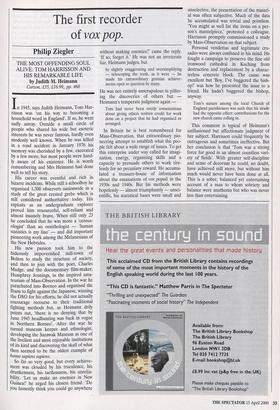The first recorder
of vox pop.
Philip Ziegler
THE MOST OFFENDING SOUL ALIVE: TOM HARRISSON AND HIS REMARKABLE LIFE by Judith M. Heimann
Curzon, £35,116.99„ pp. 468
In 1945, says Judith Heimann, Tom Har- risson was 'on his way to becoming a household word in England'. If so, he went sadly astray. Outside a small circle of people who shared his wide but esoteric interests he was never famous, hardly even modestly well known. When he was killed in a road accident in January 1976 his memory was cherished by a few, execrated by a few more; but most people were hard- ly aware of his existence. He is worth remembering and Mrs Heimann had done well to tell his story. His career was eventful and rich in bizarre incidents. While still a schoolboy he organised 1,300 observers nationwide in a study of the great crested grebe which is still considered authoritative today. His exploits as an undergraduate explorer proved him resourceful, self-reliant and almost insanely brave. When still only 23 he concluded that he was more a 'census- ologise than an ornithologist — 'human statistics is my line' — and did important pioneering work among the Melanesians of the New Hebrides.
His new passion took him to the hideously impoverished mill-town of Bolton to study the structure of society, and then to join with the poet, Charles Madge, and the documentary film-maker, Humphrey Jennings, in the inspired ama- teurism of Mass-Observation. In the war he parachuted into Borneo and organised the 1bans to fight against the Japanese, winning the DSO for his efforts; he did not actually encourage recourse to their traditional fighting methods but, as Heimann drily points out, 'there is no denying that by June 1945 headhunting was back in vogue in Northern Borneo'. After the war he turned museum keeper and ethnologist, developing the Sarawak Museum as one of the liveliest and most enjoyable institutions of its kind and discovering the skull of what then seemed to be the oldest example of homo sapiens sapiens. So far so very good, but every achieve- ment was clouded by his truculence, his drunkenness, his tactlessness, his unrelia- bility. 'Let us make no enemies in New Guinea!' he urged his closest friend. 'Do you honestly think you could go anywhere without making enemies?' came the reply. 'If so, forget it.' He was not an inveterate liar, Heimann judges, but
by slightly exaggerating and oversimplifying — telescoping the truth, as it were — he made his extraordinary genuine achieve- ments open to question by many.
He was not entirely unscrupulous in pilfer- ing the discoveries of others but — Heimann's temperate judgment again —
Tom had never been overly conscientious about giving others written credit for work done on a project that he had organised or arranged.
In Britain he is best remembered for Mass-Observation, that extraordinary pio- neering attempt to establish what the peo- ple felt about a wide range of issues. To get this enterprise under way called for imagi- nation, energy, organising skills and a capacity to persuade others to work tire- lessly for no pecuniary reward. He accumu- lated a treasure-house of information about the emanations of vox populi in the 1930s and 1940s. But his methods were hopelessly — almost triumphantly — unsci- entific, his statistical bases were small and unselective, the presentation of the materi- al was often subjective. Much of the data he accumulated was trivial and pointless. 'You might as well list the items on a per- son's mantelpiece,' protested a colleague. Harrisson promptly commissioned a study by Mass-Observation on that subject.
Personal vendettas and legitimate cru- sades were always confused in his mind. He fought a campaign to preserve the fine old ironwood cathedral in Kuching from destruction and replacement by a charac- terless concrete block. The cause was excellent but 'Boy, I've buggered the bish- op!' was how he presented the issue to a friend. He hadn't buggered the bishop, anyway.
Tom's stature among the local Church of England parishioners was such that his tirade had the opposite effect: contributions for the new church came rolling in.
This comment is typical of Heimann's unillusioned but affectionate judgment of her subject. Harrisson could frequently be outrageous and sometimes ineffective. But her conclusion is that 'Tom was a strong force for good in an almost countless vari- ety of fields'. With greater self-discipline and sense of decorum he could, no doubt, have achieved still more, but without him much would never have been done at all. This is a sober, balanced yet entertaining account of a man to whom sobriety and balance were anathema but who was never less than entertaining.


































































 Previous page
Previous page